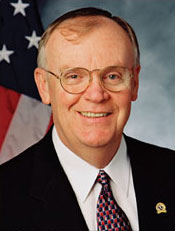Transportation Security Administration
Transportation Security Administration (TSA) is an agency of the United States Department of Homeland Security that has authority over the security of the traveling public in the United States. It was created as a response to the September 11 attacks in 2001 with the primary mission of preventing similar terrorist attacks. The TSA employs a variety of security measures both seen and unseen to secure U.S. transportation systems.
History[edit | edit source]
The TSA was established by the Aviation and Transportation Security Act, signed into law by President George W. Bush on November 19, 2001. Prior to the creation of the TSA, passenger screening in U.S. airports was the responsibility of private security companies. The events of September 11, 2001, led to the recognition of the need for a higher standard of aviation security, resulting in the federalization of passenger screening operations under the TSA.
Operations[edit | edit source]
The TSA is responsible for security operations at nearly 450 airports across the U.S. It conducts screening of passengers and baggage to prevent prohibited items such as weapons and explosives from being carried onto aircraft. The TSA also works to secure the freight and rail transportation sectors.
Screening Procedures[edit | edit source]
The TSA has implemented a number of screening procedures, including the use of Advanced Imaging Technology (AIT) scanners, which are used to detect prohibited items without physical contact. Passengers may also be subject to pat-down searches if necessary. The TSA's PreCheck program allows pre-screened travelers to undergo a more streamlined security process.
Security Measures[edit | edit source]
In addition to passenger screening, the TSA employs a number of other security measures, including the Federal Air Marshal Service (FAMS), which deploys armed marshals on flights to prevent hijackings and terrorist acts. The TSA also oversees the Secure Flight program, which pre-screens passenger information against government watch lists.
Controversies[edit | edit source]
The TSA has faced criticism and controversy over the years, particularly regarding the effectiveness and intrusiveness of its screening procedures. Concerns have been raised about privacy issues related to the use of full-body scanners and the invasiveness of pat-down searches. There have also been debates about the efficiency and customer service aspect of TSA operations.
Future Directions[edit | edit source]
The TSA continues to evolve its security measures in response to emerging threats. This includes the development of new technologies and procedures to enhance the effectiveness of airport security while also improving the passenger experience. The agency also works on expanding programs like TSA PreCheck and exploring innovations in biometric verification.
This article is a government-related stub. You can help WikiMD by expanding it!
Search WikiMD
Ad.Tired of being Overweight? Try W8MD's physician weight loss program.
Semaglutide (Ozempic / Wegovy and Tirzepatide (Mounjaro / Zepbound) available.
Advertise on WikiMD
|
WikiMD's Wellness Encyclopedia |
| Let Food Be Thy Medicine Medicine Thy Food - Hippocrates |
Translate this page: - East Asian
中文,
日本,
한국어,
South Asian
हिन्दी,
தமிழ்,
తెలుగు,
Urdu,
ಕನ್ನಡ,
Southeast Asian
Indonesian,
Vietnamese,
Thai,
မြန်မာဘာသာ,
বাংলা
European
español,
Deutsch,
français,
Greek,
português do Brasil,
polski,
română,
русский,
Nederlands,
norsk,
svenska,
suomi,
Italian
Middle Eastern & African
عربى,
Turkish,
Persian,
Hebrew,
Afrikaans,
isiZulu,
Kiswahili,
Other
Bulgarian,
Hungarian,
Czech,
Swedish,
മലയാളം,
मराठी,
ਪੰਜਾਬੀ,
ગુજરાતી,
Portuguese,
Ukrainian
Medical Disclaimer: WikiMD is not a substitute for professional medical advice. The information on WikiMD is provided as an information resource only, may be incorrect, outdated or misleading, and is not to be used or relied on for any diagnostic or treatment purposes. Please consult your health care provider before making any healthcare decisions or for guidance about a specific medical condition. WikiMD expressly disclaims responsibility, and shall have no liability, for any damages, loss, injury, or liability whatsoever suffered as a result of your reliance on the information contained in this site. By visiting this site you agree to the foregoing terms and conditions, which may from time to time be changed or supplemented by WikiMD. If you do not agree to the foregoing terms and conditions, you should not enter or use this site. See full disclaimer.
Credits:Most images are courtesy of Wikimedia commons, and templates, categories Wikipedia, licensed under CC BY SA or similar.
Contributors: Prab R. Tumpati, MD






